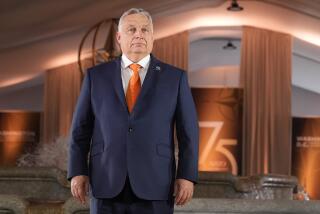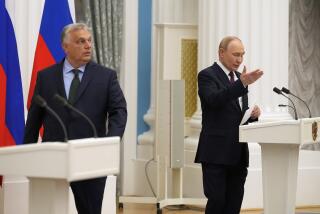NEWS ANALYSIS : Political Profits of Globe-Trotting : Europe: Clinton learns that a foreign jaunt can be more fun than staying home, as well as offering a boost to his image.
- Share via
GENEVA — For most of his first year as President, Bill Clinton put off the day when he would have to extend his laser-like focus beyond domestic policy to take in foreign affairs. Last week, the day came.
And, in a series of summit meetings that took him across Europe to Russia and back again, he learned what many of his predecessors had found before him: Globe-trotting can be more fun and more politically profitable than staying home.
As Washington bubbled over Clinton’s involvement in a murky Arkansas land deal, half a world away the President scored a foreign policy coup by winning a new agreement on removing nuclear missiles from Ukraine. He won the Western Alliance an endorsement of a new, more inclusive blueprint for European security in post-Cold War Europe. He steadied Russian President Boris N. Yeltsin on the course of economic reform.
What’s more, he did it all without any of the meddling by Congress and others that continuously frustrates his designs in Washington.
With his walks and talks amid the spires and domes of Eastern Europe dominating the news images, he could say to a television interviewer that “this has been a very, very successful trip” without fear that faraway political rivals would invade his sound bite.
Clinton’s shift in attention has come for several reasons. He needed to take on European policy questions that had been crying for his attention for a year. Even some aides acknowledge that these questions, which included the future of the North Atlantic Treaty Organization and fraying relations with America’s historic partners in Western Europe, were neglected in Clinton’s first year.
And Clinton has recognized a political fact of life that his predecessors knew well: At home, the President must share power, but in foreign affairs, the authority to act--and the credit--is largely his alone.
When he returns to Washington tonight, Clinton will bring home at least one genuine accomplishment: an agreement from Ukraine to remove the nuclear weapons left on its territory when the Soviet Union disintegrated, beginning with the modern SS-24 missiles that U.S. military strategists feared most. If the accord is carried out, it will be a significant success in the Administration’s effort to stop the spread of nuclear weapons from the former Soviet republics to other countries.
To be sure, Ukrainian President Leonid Kravchuk faces internal opposition to carrying out the agreement, so in the end the deal may not fully live up to its billing.
Even so, in terms of U.S. public opinion, the week made America’s “domestic President” four for four on international trips. On earlier journeys--to meet Yeltsin in Vancouver, Canada, Pacific Rim leaders in Seattle and the chiefs of other big industrial nations in Tokyo--he showed that he could handle economic summitry without a slip.
This time, the week started on a wobbly note but seemed to gain momentum as the U.S. contingent moved toward Moscow.
In Brussels, Clinton wanted to focus on the new security alliance with the East European nations but was forced to take up the disagreeable task of issuing new military threats to the Bosnian Serbs. In Prague in the Czech Republic, he won an endorsement of the “Partnership for Peace” plan for the nations of Eastern Europe, but in the process he was forced again to face their criticism that the plan left them vulnerable to an unstable Russia.
Still, signs were strewn along the way that Clinton is becoming more comfortable with the foreign affairs side of his job. Although the chemistry is not good with French President Francois Mitterrand and almost nonexistent with British Prime Minister John Major, he got along with Yeltsin, German Chancellor Helmut Kohl and Czech President Vaclav Havel, and he accumulated generally good reviews from much of Europe along the way.
A compulsive rewriter of his domestic speeches, Clinton usually sticks close to the text of his foreign policy speeches. But in his remarks at the Ostankino television complex in Moscow, where only three months ago troops loyal to Yeltsin battled his enemies and more than a dozen people died, he picked up the editing pencil to rewrite a good chunk of his speech.
The speech was the kind of personal appeal he makes to Americans, and his engagement in them suggests he is most energized when he is translating his foreign policy into domestic terms.
On this trip, as at home, Clinton spoke of his sympathy for his audience’s suffering, their need to embrace constant change and to gird themselves for the hard work of competing in the world economy. All this sounded eerily familiar to those who know Clinton’s domestic speeches.
But that was understandable, aides said, because Clinton’s domestic policy is precisely the same as his foreign policy. “He’s got only one stump speech,” an official said.
The trip presented a feast of opportunities for political showmanship aimed as much at American as at foreign audiences. And it gave Clinton an opportunity to see if the image-making techniques--and messages--he has used in the United States could be applied to build support abroad.
The big score, in the White House’s view, came from Clinton’s televised town hall meeting at Ostankino in Moscow.
Officials hoped it would show average Russians a politician who could meet them at eye level. They got an unexpected payoff with a domestic audience from a widely rebroadcast scene in which a 13-year-old Russian boy who had seen a photo of Clinton as a teen-ager shaking hands with President John F. Kennedy asked when his presidential ambitions had begun to take root, and Clinton invited him to shake his hand. “Come shake hands with me, and maybe you’ll be president of Russia some day,” Clinton told him.
But if Clinton avoided major blunders during the first European trip, he had some near-misses, including Ostankino. The affair may not have been such a success with Clinton’s Russian audience, some of whom said he seemed condescending when he lectured them on free-market capitalism and too glib when he said he understood their pain but urged them to buck up.
If nothing else, such reactions were a reminder that a politician inexperienced in foreign affairs--as Clinton is--can have perfect pitch with U.S. audiences but get off a clanger with groups whose special sensitivities he does not understand.
Many Russians, for instance, feel deeply humiliated by their country’s slide from superpower status into chaos; lectures from Americans are salt in the wound.
Similarly, addressing college students in Brussels’ historic town hall, Clinton was apparently disappointed in his listeners’ failure to respond more enthusiastically. But the progeny of Belgium’s stolid burghers are not brought up to cheer the likes of a President as though he were a rock star.
Clinton also avoided a pratfall in a joke comparing Kohl to a sumo wrestler only by including himself in the jest at the last moment. And some Ukrainians took it badly when Clinton quipped that Kravchuk’s firm handling of reporters during an appearance at Kiev’s airport might qualify him for work as a White House press aide.
Nonetheless, even many of those scenes made strong images back home.
There were pictures too of Clinton consorting with Havel, hero of democracy and culture, in the cabarets of Prague, and of Yeltsin in the Kremlin and babushkas on the slushy streets of Moscow.
Aides were open about their hopes for the trip. “Your domestic stock goes up if you show yourself to be a good world leader,” one said.
But White House officials acknowledged the difficulty Clinton faced in properly expressing his advice to East Europeans. He needed, one said, “to express sympathy for what people were going through, without sounding patronizing.”
Perhaps for this Administration, the tasks of foreign policy are made easier by a conviction that concerns of the world abroad are still not quite as crucial for the President as those he faces at home.
“The American people don’t want a President who spends all his time on foreign policy the way George Bush did,” one official said. “They want a President who they can feel assured will perform well in a crisis, and not much more than that.”
More to Read
Sign up for Essential California
The most important California stories and recommendations in your inbox every morning.
You may occasionally receive promotional content from the Los Angeles Times.












